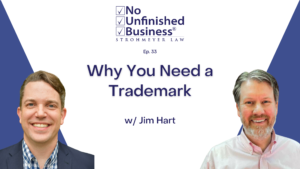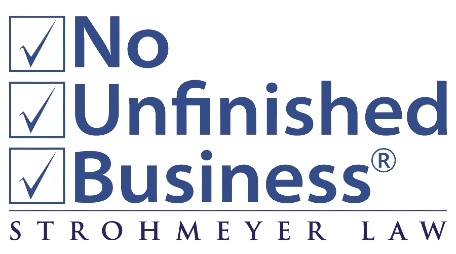Business-Owned Life Insurance: Key Issues to Consider
Business-Owned Life Insurance
Business owners! Make sure you’re staying in compliance and tax-advantageous with regards to your company-owned life insurance policies on employees (aka Keyman or Keyperson Insurance).
Usually these policies are taken out on essential parties (usually owners, stakeholders, and top execs) to help ensure the life of the business, but they’re not treated like most other business assets. Let Board-Certified Tax Attorney John Strohmeyer explain what you need to consider.
VIDEO TRANSCRIPT:
Hey, John Strohmeyer here. Today, we’re talking about life insurance that is owned by a business and making sure that you’re not gonna pay tax on that insurance.
The basics on taxing insurance
This has been called different types of insurance. Sometimes, it’s just a benefit provided by the company, but a lot of times companies are using this as key man or key person insurance to ensure a company’s continued survival if an important person dies. The important thing to think about is that there’s a great benefit and an underlying benefit that most insurance salespeople are thinking about. When you sell life insurance, normally that benefit is provided. So, the important thing to remember is that while insurance is normally received income tax free, there are special rules when that insurance is owned by an employer.
So, we go back to internal revenue code, section 101, and that’ll give you the magic language that says income received from life insurance is free of income tax. But, when we skip on down to 101 J, well, employer owned life insurance contracts, those benefits, which are paid out on death, are only excluded from gross income to the extent that you have paid into the contract.
So, if you spend a hundred dollars in premiums, get a thousand dollars back as a death benefit, a hundred dollars is excluded from income. The other $900 will be subject to income tax. This is not what you’re looking for. And it’s probably not what you’ve been told about your life insurance policy. So yes, there is a way to get those proceeds excluded from gross income, but it does require a few other steps. And it’s important because a lot of times I’ve seen clients and their businesses who have not done what they need to. So, make sure that you, as a business owner, are taking care of your income tax responsibilities, making sure that your life insurance gets the benefits you want.
Here’s what you need to be thinking about
First make sure you know what type of insurance this covers. Employer owned life insurance contracts are contracts that are owned by a person engaged in a trade or business. And when we say person, we do mean an entity, and so, part two, under which that person is either directly or indirectly a beneficiary of the contract. So, in the case of key person insurance, typically the firm is going to be buying life insurance on one of its higher up employees. Therefore, if that person does pass, the business has money to either continue business operations, maybe wind things down, or possibly just buy out the stock owned by that key person.
Some conditions
Now, the other thing to think about: that life insurance needs to cover the life of an insured who is an employee regarding the trade or business on the date that the contract is issued. So, if you’re picking up an insurance policy on somebody who works for you, this is going to get covered.
The reason they put this in is because there were a lot of businesses that were taking out life insurance on their employees and not telling the employees that they had done this. 101J is going to specify certain notice and consent requirements to ensure that the life insurance is exempt from income tax when it’s received.
Notice & consent requirements
We have these notice and consent requirements to make sure that we’re not paying income tax on employer owned life insurance. How do we make sure that we’ve done what we need to? Well, first things first, you need to make sure that the employee is notified in writing that the policy holder, the company, intends to insure the employee’s life and what the maximum face amount for which that employee could be insured when the contract is issued.
Item number two: the employer needs to get written consent from that employee to being insured under the contract and knowing any contract may continue after the insured terminates their employment. Finally, the employee needs to be informed in writing that an applicable policy holder, which is a group of people, generally including the business, will be a beneficiary of any proceeds payable upon the death of that employee.
Basically, all of this gets at making sure the employee knows that there is going to be life insurance taken out on them. They know how much, and they know who’s going to be paid and, finally, whether or not insurance will continue after they are no longer employed.
Are premiums deductible?
One: premiums for policies like this are not going to be deductible. They must be paid with after tax dollars by the company. Now, if the employee passes away, the death benefits are going to be paid to the company and no income tax is going to be assessed. So, really, we’re only getting one tax-free bike and that’s coming with the death benefits.
Now, before those benefits are received, the company needs to comply with the noticing filing requirements we just talked about to receive that tax treatment.
Aren’t those premiums usually deductible?
Now, in most cases, premiums paid on life insurance covering an employee’s life are deductible as a trade or business expense if the employer, meaning the company, has no ownership rights or beneficial interest in the policy or proceeds.
Basically, it’s going to be treated as income that’s going to get picked up by the employee as income during their life. The proceeds probably are then going to be paid to the employees estate or some designated beneficiary. Basically, we’re getting around the key person insurance contract or a concept, and we’re really paying these benefits out as a benefit of working at the company.
The company is kind of facilitating this life insurance. The PR and the premiums may be deductible, but they’ve got to represent reasonable compensation for services rendered by the employee. So, the key is we’re not getting around non-deductability of insurance premiums just because it’s run through the company.
Either the company is going to be paying for those premiums and it’s not deductible, or it’s going to be paying for the premiums and it’s deductible, but it’s compensation. Treated and picked up all by the employee on their income tax return. Now, you may say, “Well, isn’t this an ordinary and necessary business expense if we’re insuring the life and, ultimately, the continued existence of our business, really?”
No, not everything is a deductible expense. And, if you’re paying for life insurance on a stake holder or a stockholder, that may be treated as some sort of dividend from the company.
Buying out shares after death
Another thing to think about: if you’re going to be funding a buyout of a deceased shareholder after their death. Those premiums really are not going to be deductible by the corporation as well. The deduction is being disallowed because those premiums are not ordinary and necessary business expenses, but really it’s going to be treated more like a capital expenditure made for the acquisition of a corporate asset, meaning the company’s buying this life insurance to require its own stocks. So, that’s a capital asset acquisition. Really, there’s no reason to incentivize that behavior with a tax benefit.
Forms
So, we’ve got our notice and consent requirement handled. What do we do next? Well, there’s a form for this, like there are for many things. IRS form 8925. The report of employer owned life insurance contracts are used to make sure that you are funding and not only are you paying for these life insurance contracts, but you’re telling the IRS about it. So, for the name shown on the return, this would be the name of the company or the name of the policy holder, if it’s somehow different.
Letting them know what your business tax ID numbers are. And then, just some basic information about this. The important thing to know is that this is not an overly complicated form, but it is something that needs to be filed on an annual basis. Again, who files this? Well, generally every policy holder owning one or more insurance policies on the life of an employee.
When to file it?
This is getting filed for each tax year during which a policy holder has that policy in force. So when we think about this, this is something that’s going to be an ongoing obligation for your business. It’s not a one and done, you need to be doing this as part of your annual tax compliance.
Well, what if we haven’t gotten around to this before? That’s okay. Start doing it as soon as possible. There’s really nothing to do other than get in compliance with the IRS. The rules on this could change at any time, but the IRS does know this as an issue. So, the thing to take home is that if you have employer owned or business owned, key person insurance, you do have a new tax filing.
Final thoughts
You do need to talk to your tax advisors to make sure that you are complying with this and picking up that 8925. You also want to make sure that the noticing consent forms are being signed. You don’t have to sign them necessarily every year, but you do want to make sure that everybody who does have insurance coverage from the company is complying with this because the downside is pretty big.
We’re going to take insurance that you want to be tax-free and you’re potentially making it subject to income tax. You got questions about this life insurance, drop them in the comments below. Thanks for watching.
End-of-Year Strategies for Irrevocable Gifting Trusts
As the year draws to a close, there are some crucial actions to take with an irrevocable gifting trust.
What to Do If You Receive an IRS Letter
Receiving a letter from the IRS might send shivers down your spine. So what's your first step? Is it always a cause for alarm? Let's walk through what you should do.
Why You Need a Trademark
We'll explain the the four main areas of intellectual property for business owners, why trademarks are crucial, and how to get your marks registered.





